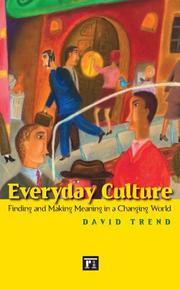Everyday Culture: Finding and Making Meaning in a Changing World, Routledge (2007).
EVERYDAY CULTURE draws its inspiration from a particular historical moment. In 1968 the meanings and potentials of ordinary life received attention in cultural and political circles throughout the western world as never before. Radios were playing “Everyday People,” a song by the rock/funk band Sly and the Family Stone. Released in the months following the infamous Tet Offensive in Vietnam and the assassination of Martin Luther King, “Everyday People” captured the spirit of US culture as a plea for peace and equality. Remembered for it’s chorus, “I am everyday people,” the song resonates in a celebration of diversity, as lead singer Sly Stone Stewart proclaims “We are the same whatever we do” with the refrain, “We’ve got to live together.” “Everyday People” holds the distinction as the first hit song in the U.S. by a multi-racial performing group.
the song resonates in a celebration of diversity, as lead singer Sly Stone Stewart proclaims “We are the same whatever we do” with the refrain, “We’ve got to live together.” “Everyday People” holds the distinction as the first hit song in the U.S. by a multi-racial performing group.
As “Everyday People” was moving to the number one spot on the U.S. pop chart, a more material manifestation of the everyday was taking hold in Europe. In May 1968 a general strike erupted in France within universities and high schools in a series of uprisings protesting poor wages and governmental wrongdoing. From riots outside the Sorbonne in Paris, the strike quickly was joined by workers, minorities, the French Communist party, and members of Situationist Internationale. Within a week France was crippled by a work stoppage of 10-million people––roughly two thirds of the nation’s labor force––making it the largest strike in recorded history.
Informed in part by these historical legacies, Everyday Culture is about the confluence of cultural and material possibility––the bringing together of thought and action in daily life. The book argues that an informed and invigorated citizenry can help reverse patterns of dehumanization and social control. The impetus for Everyday Culture can be described in the observation by Raymond Williams that “culture is ordinary,” and that the fabric of meanings that inform and organize everyday life often go undervalued and unexamined. Everyday Culture shares with thinkers like Williams the conviction that it is precisely the ordinariness of culture that makes it extraordinarily important. The ubiquity of everyday culture means that it affects all aspects of contemporary economic, social and political life. Seen his light, Everyday Culture is about a hope for a better future.